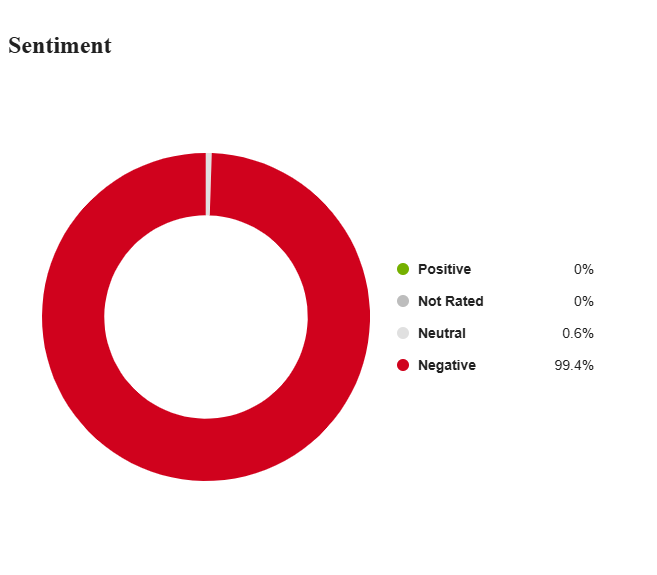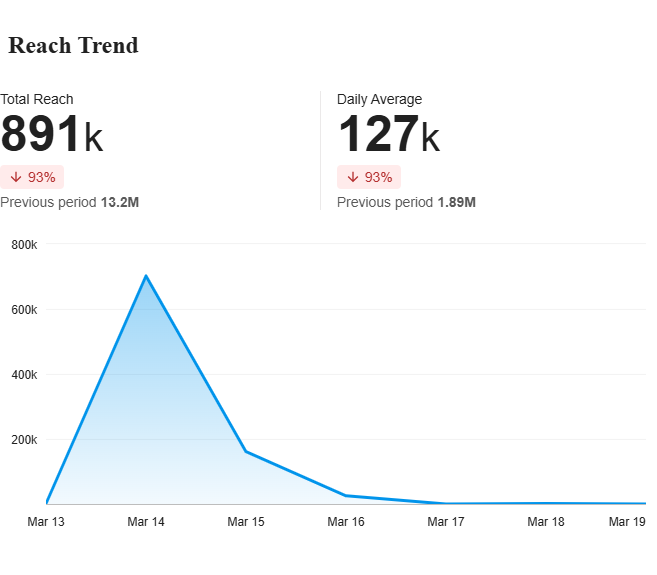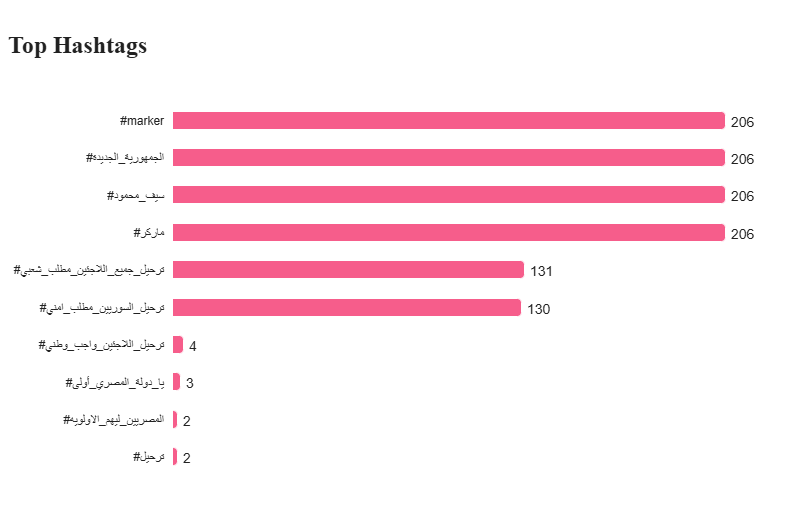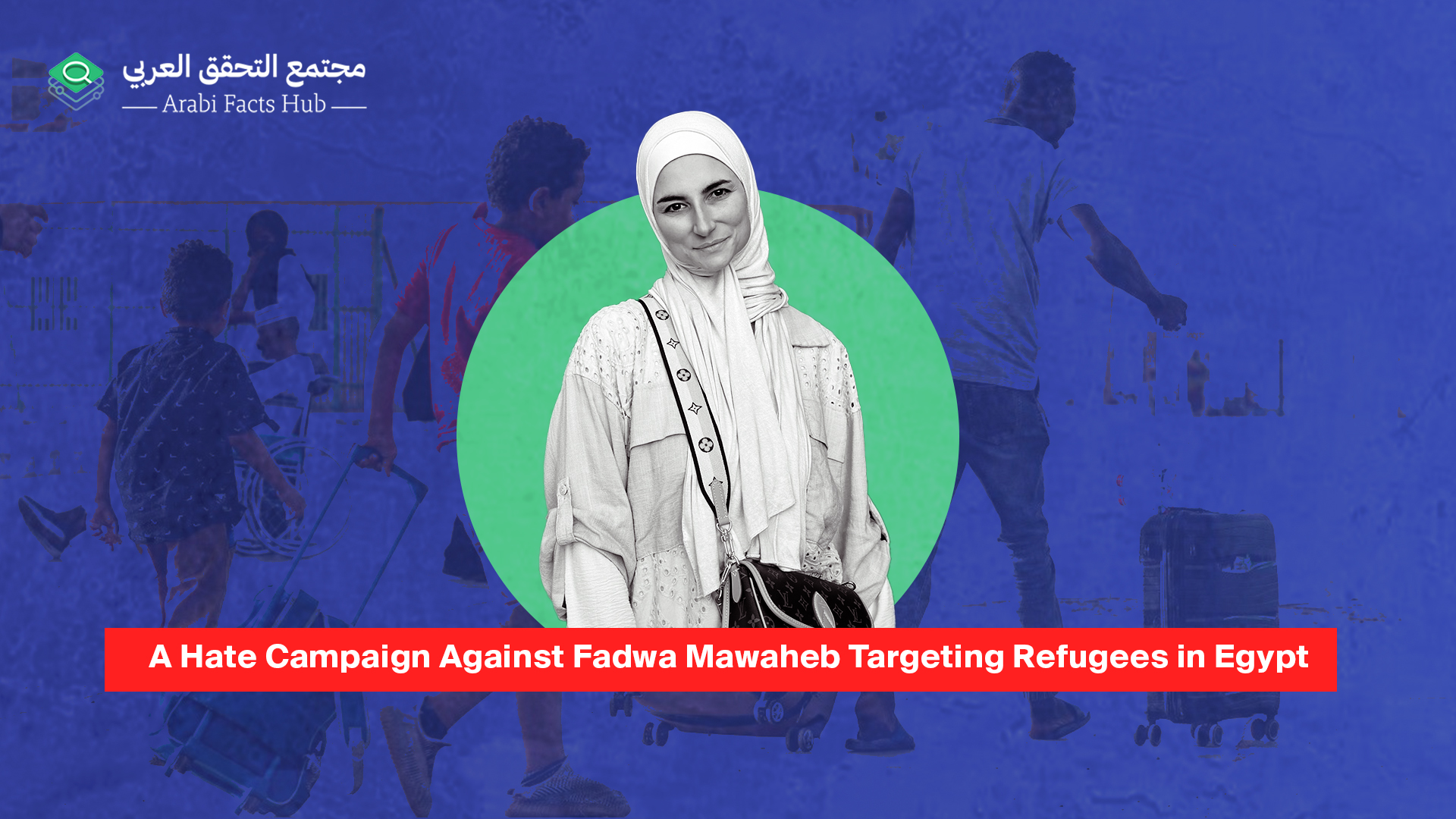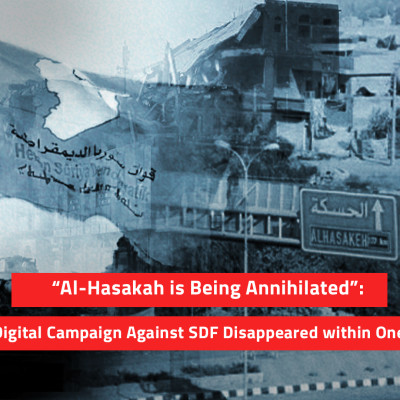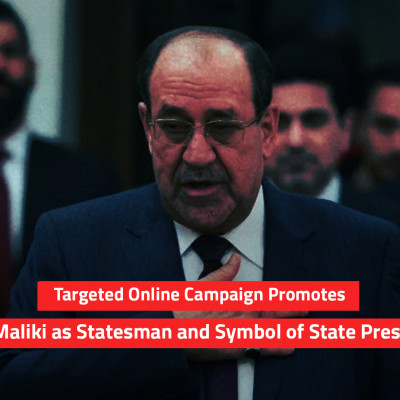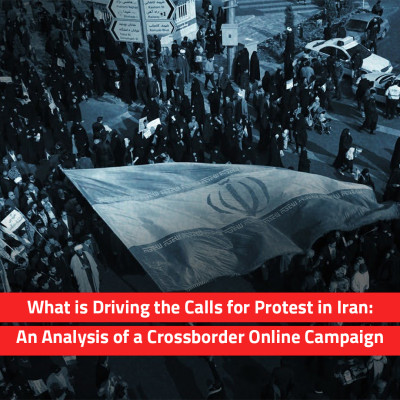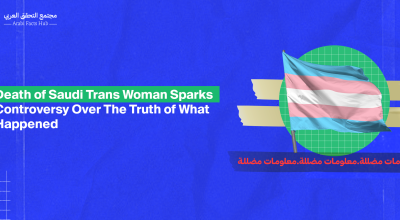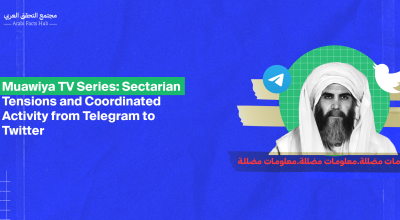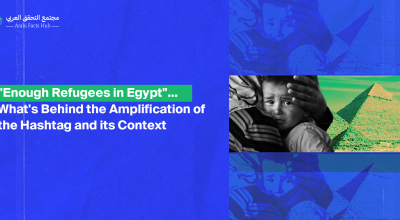Former director Fadwa Mawaheb posted a photo of the statue of Ramses II, accompanied by a caption that read, "Glory to Allah, the King. To Him alone belongs the kingdom." She later deleted the post and shared a clarification, insisting that she had no intention to offend Egyptians. However, the photo had already sparked a wave of criticism, culminating in a lawsuit against her. An Egyptian lawyer filed a complaint accusing her of insulting Egyptian civilization and demanded that she be banned from teaching and prohibited from engaging in activities on social media platforms.
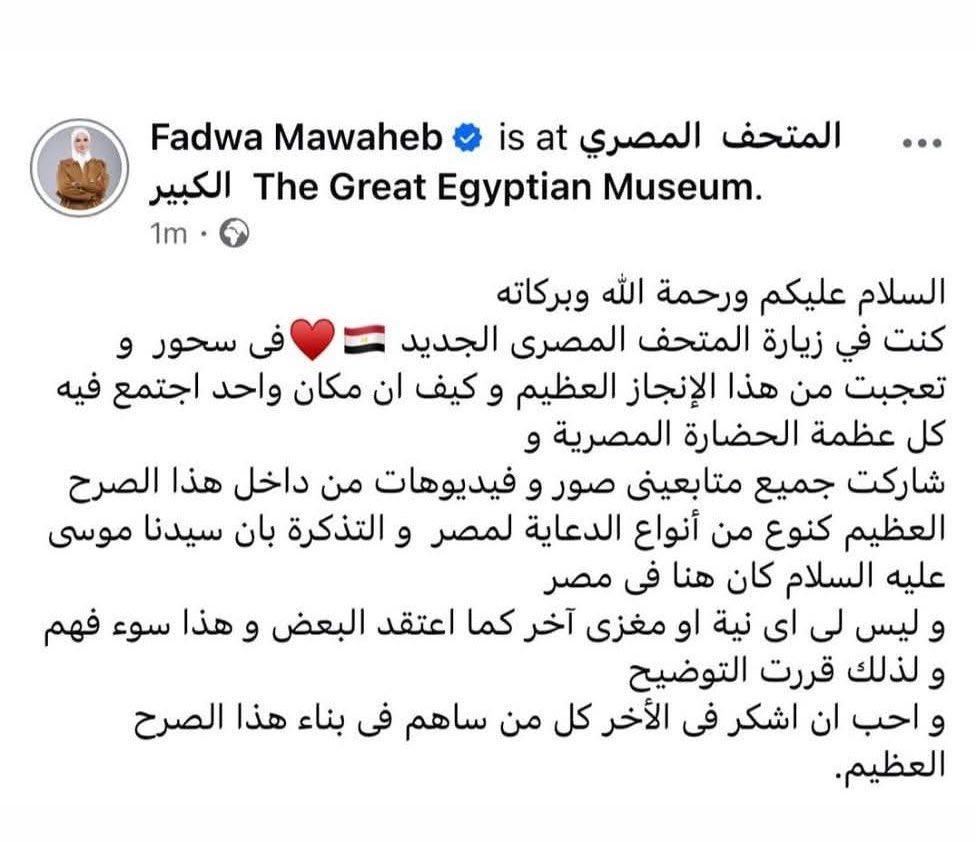
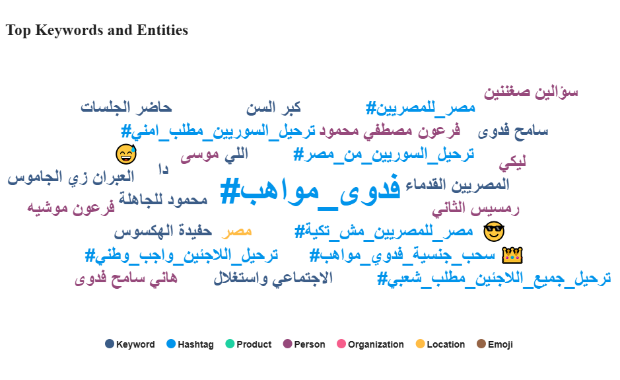
In parallel with filing the lawsuit, a digital campaign erupted, spreading hate speech targeting Fadwa Mawaheb, focusing on her Syrian roots despite her having acquired Egyptian citizenship. The campaign quickly expanded to target all refugees, calling for their deportation. The hashtag "#فدوى_مواهب" (Fadwa Mawaheb) became associated with several other hashtags opposing refugees, such as: #ترحيل_السوريين_من_مصر (Deport Syrians from Egypt), #مصر_للمصريين_مش_تكية (Egypt Is for Egyptians, Not A Charity), #ترحيل_جميع_اللاجئين_مطلب_شعبي (Deporting All Refugees Is A Public Demand), and #ترحيل_السودانيين_من_مصر (Deport Sudanese Refugees from Egypt).
Other hashtags also spread, personally attacking Fadwa, labeling her as "Hyksos" and "granddaughter of the Hyksos," accompanied by calls to revoke her Egyptian citizenship and deport her.
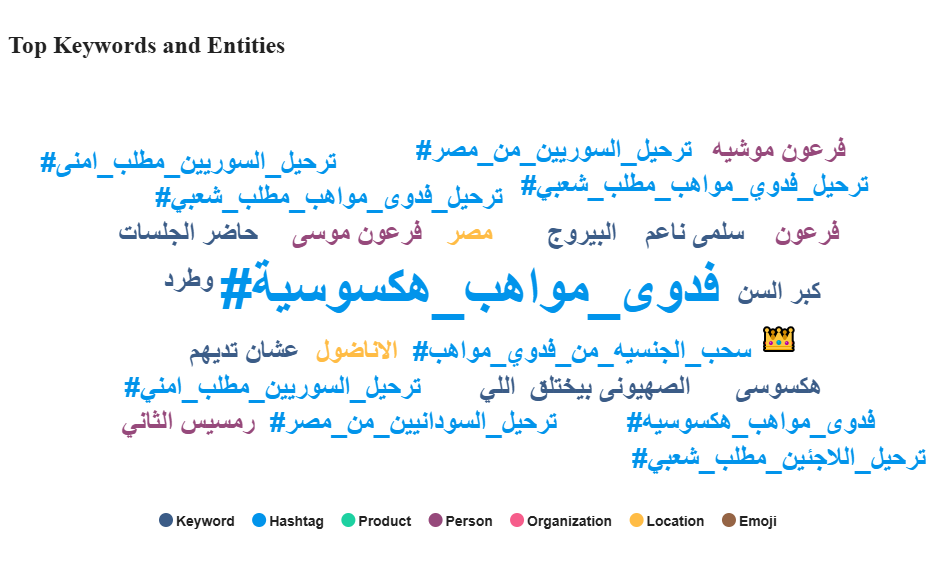
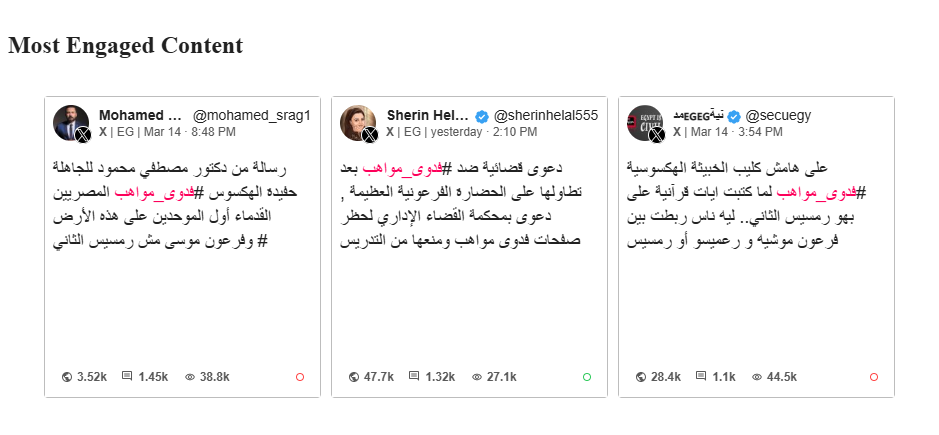
Campaign Indicators
Following the publication of Fadwa Mawaheb’s photo of the Ramses II statue at the Egyptian Museum, the hashtag #فدوى_مواهب (Fadwa Mawaheb) surpassed 4,000 posts in under a week, reaching an audience of over 15 million. The hashtag spread at a rate of nearly one million views per day.
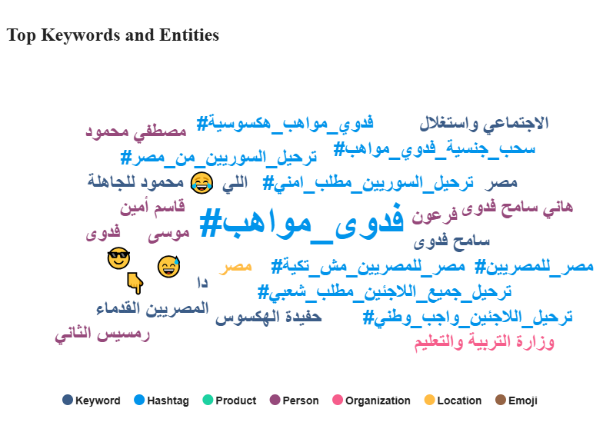
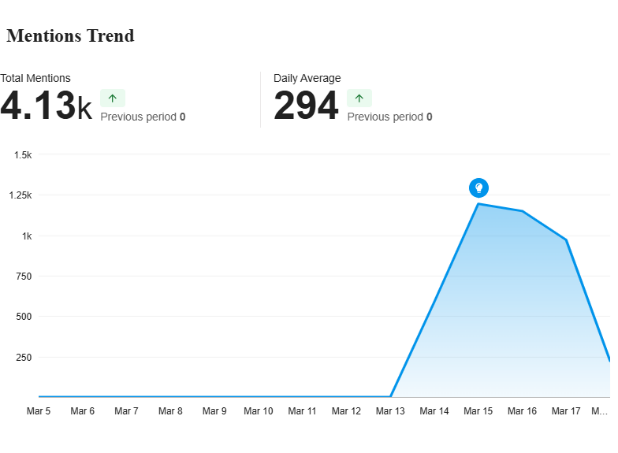
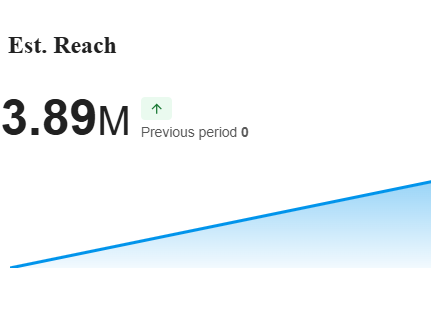
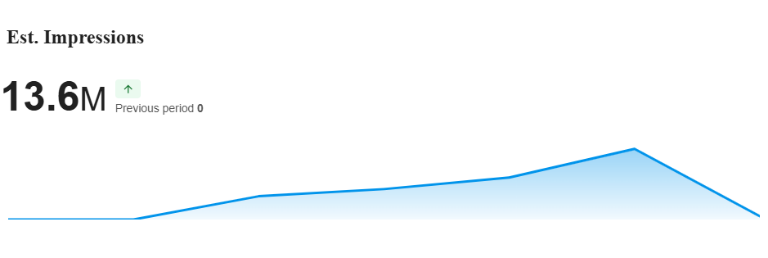
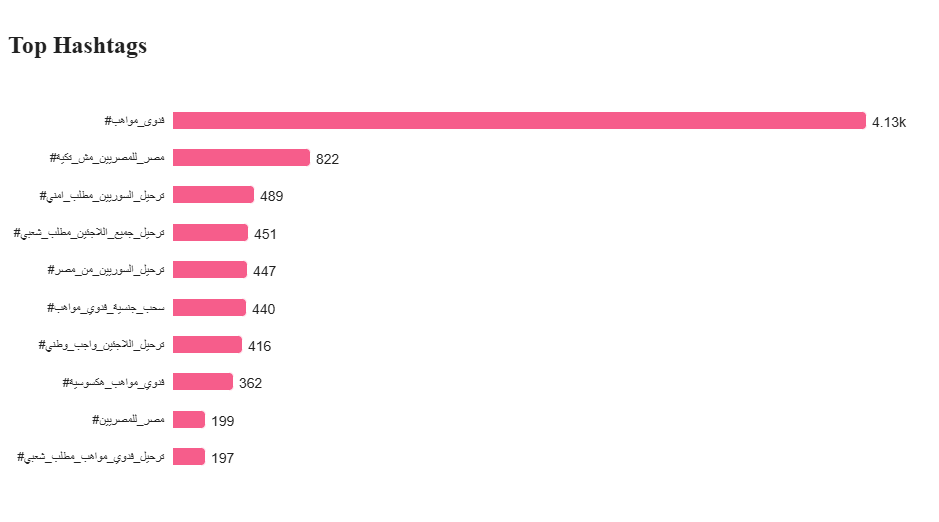
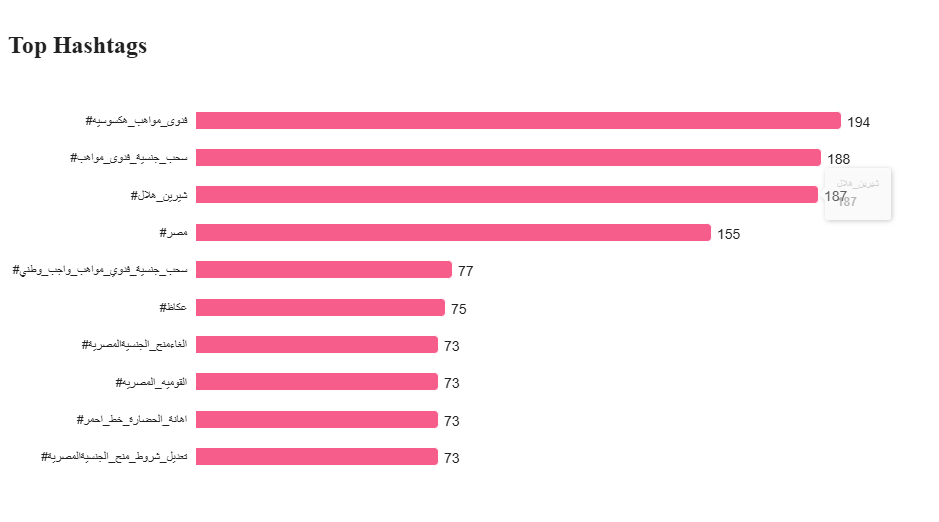
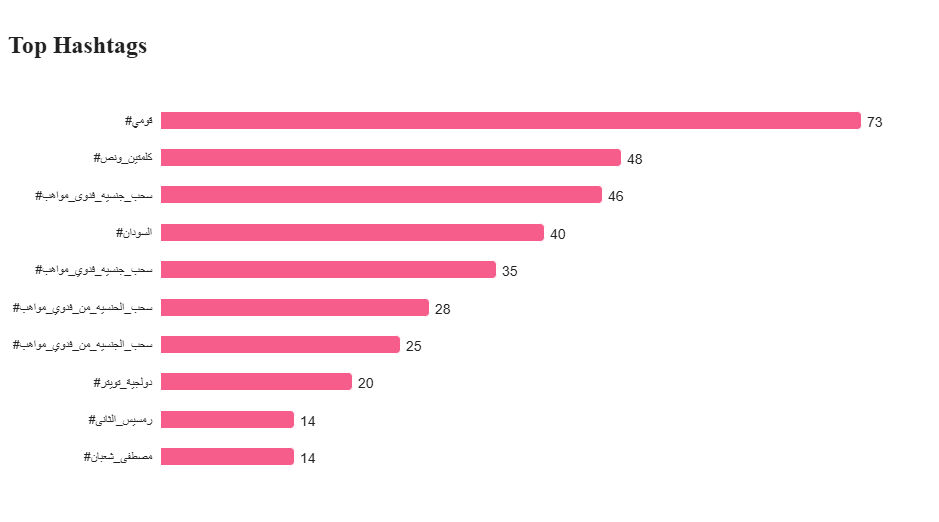
Analysis showed that the majority of users engaging with the hashtag #فدوى_مواهب (Fadwa Mawaheb) and related hashtags about refugees were based in Egypt, followed by the United States, Saudi Arabia, and the United Kingdom. Many users were found to have shared identical posts, describing Fadwa as “an ignorant descendant of the Hyksos”, or calling for her prosecution, the revocation of her Egyptian citizenship, and her deportation from the country.
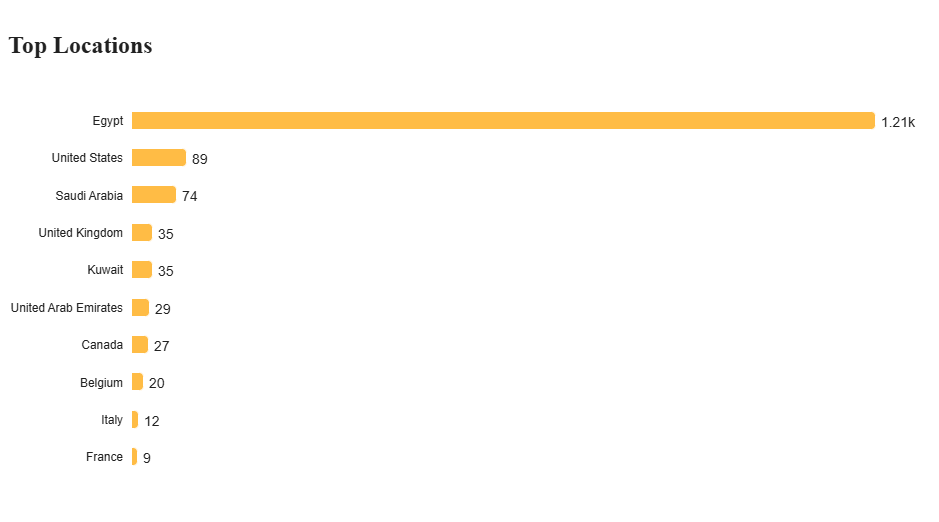
Analysis revealed that original content under the hashtag #فدوى_مواهب (Fadwa Mawaheb) accounted for only 4.3% of total posts, while reposts, replies, and quote tweets made up more than 95% of overall interactions. This suggests that the campaign was heavily amplified, rather than being organic or spurring spontaneous engagement.
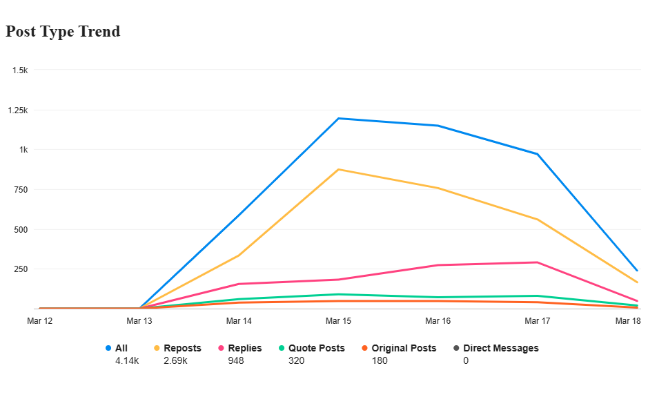
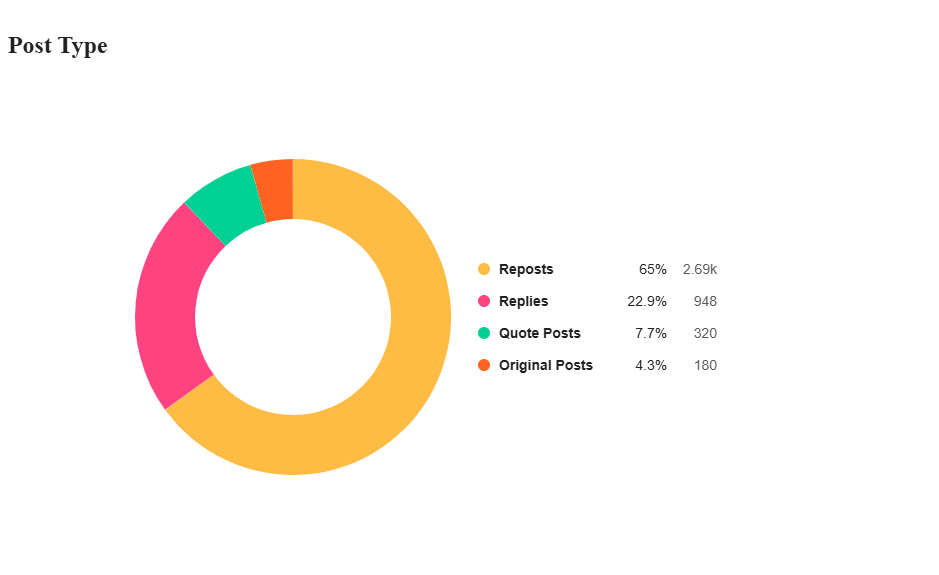
Who Directs the Campaign?
To analyze the discourse targeting Fadwa Mawaheb and refugees in Egypt—and to verify whether the posts about her were part of a deliberate, amplified digital campaign—we extracted a random sample of tweets using Meltwater. The sample included approximately 4,100 posts published between March 13 and 18, 2025, during the peak of online engagement around the hashtag “Fadwa Mawaheb”.
Data analysis revealed a notable repetition of specific posts that directly spread hate speech against Fadwa and refugees. This supports the hypothesis that the campaign was coordinated and manufactured, rather than organic.
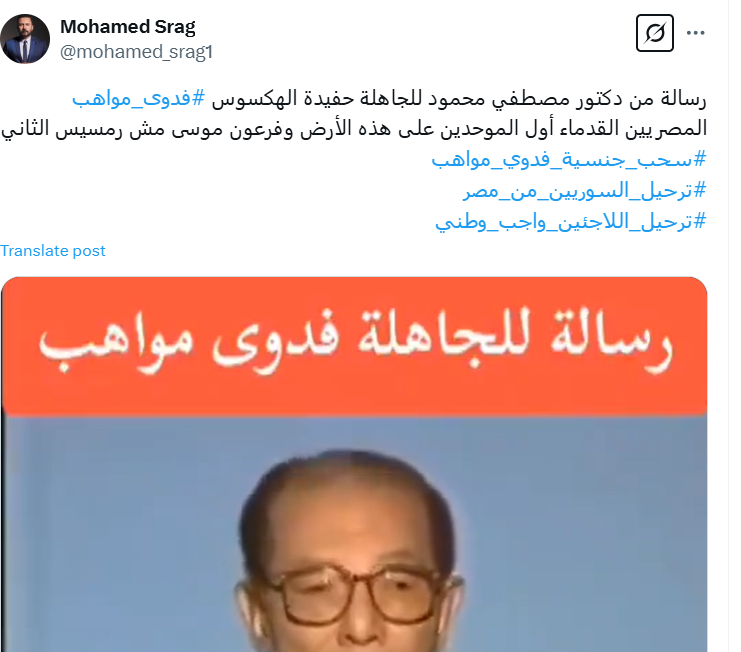
Of the most widely circulated posts was one describing Fadwa Mawaheb as "the ignorant descendant of the Hyksos", accompanied by a video clip of Dr. Mostafa Mahmoud discussing monotheism in ancient Egypt. This post was shared 424 times within the network of users engaging with the hashtag “Fadwa Mawaheb”.
It was also linked to three main hashtags:
- #سحب_جنسية_فدوى_مواهب ("Revoke Fadwa Mawaheb’s Citizenship"),
- #ترحيل_السوريين_من_مصر ("Deport Syrians from Egypt"), and
- #ترحيل_اللاجئين_واجب_وطني ("Deporting Refugees is a National Duty").
These connections further emphasize the overlap between the personal targeting of Fadwa and broader anti-refugee rhetoric.
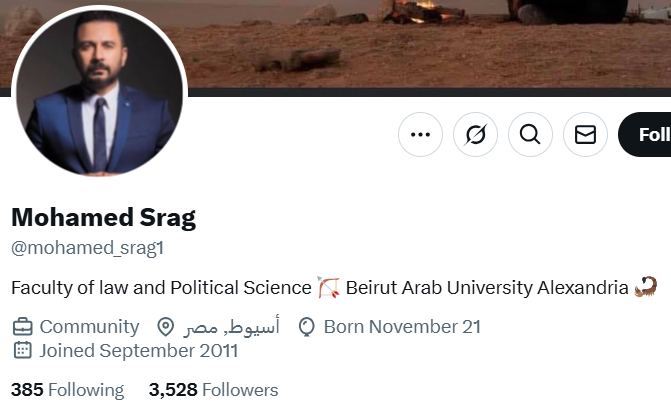
The post that received the highest engagement under the hashtag #فدوى_مواهب (Fadwa Mawaheb) was published by the account @mohamed_srag1, which identifies as belonging to a student at the Beirut Arab University in Alexandria, majoring in Law and Political Science. However, the profile picture used on the account actually belongs to Egyptian actor Ahmed Said Abdel Ghani, and no verifiable information could confirm that the account belongs to a real individual.
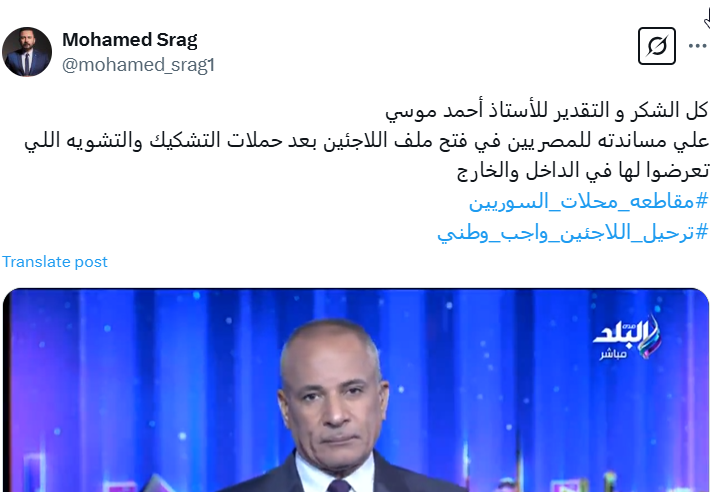
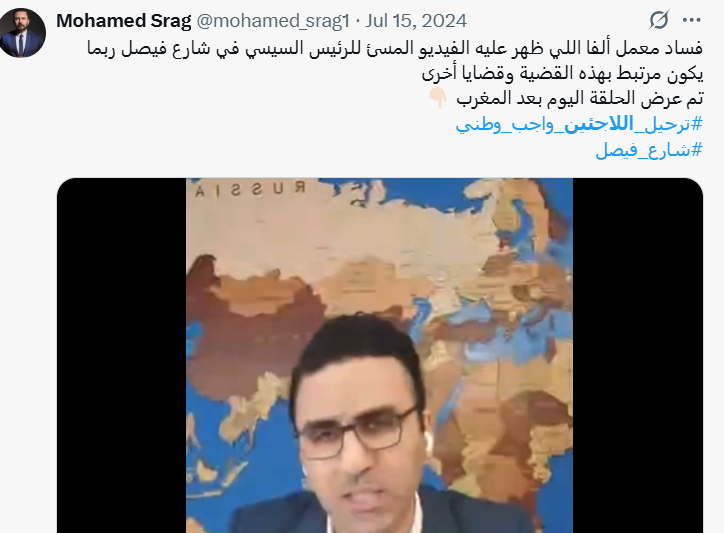
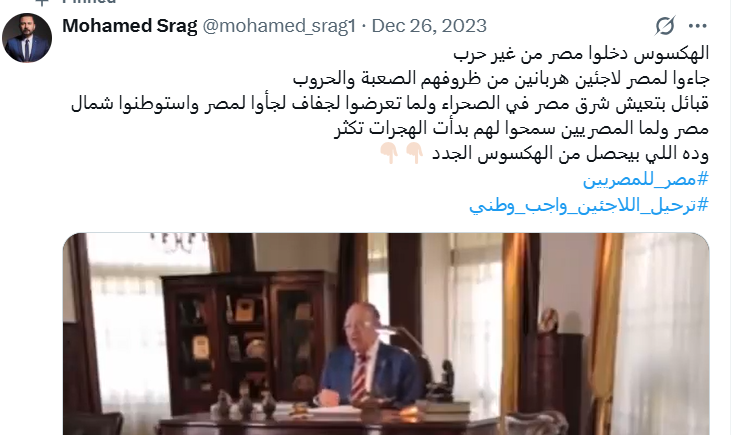
Previous posts by the account indicate that it has been active on several hashtags promoting hate speech against refugees in Egypt and calling for their expulsion. These include hashtags such as #مقاطعه_محلات_السوريين (Boycott Syrian Shops) and #ترحيل_اللاجئين_واجب_وطني (Deporting Refugees is a National Duty).
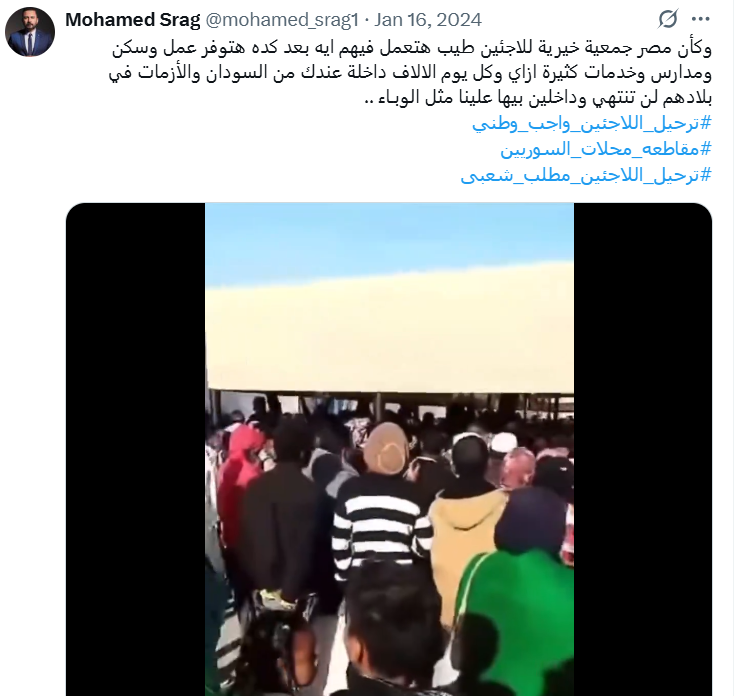
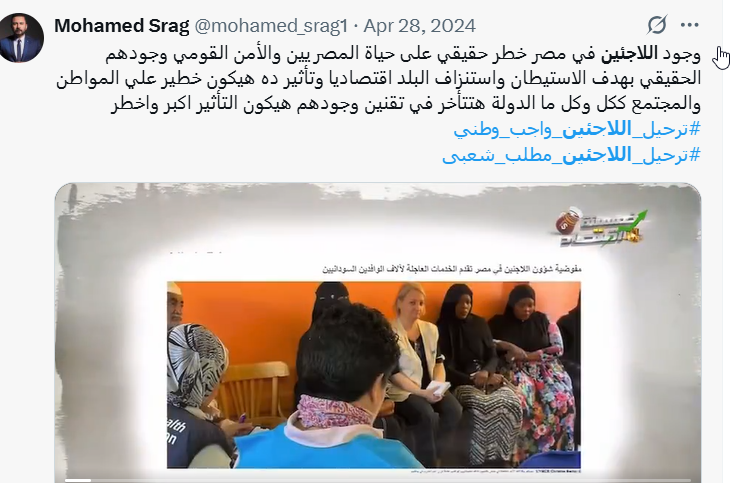
The account also focused on portraying the refugee issue as a national threat that drains Egypt’s economic resources, inciting violence against them. To support this narrative, it relied on dinformation—most notably, claims that refugees are “stealing” Egyptians’ rights and causing widespread poverty.
One of the key pieces of disinformation used was a misrepresented statement attributed to Egyptian Prime Minister Mostafa Madbouly, alleging that the cost of hosting over nine million refugees in Egypt exceeds $10 billion.
However, according to data from the United Nations High Commissioner for Refugees (UNHCR), the actual number of registered refugees and asylum seekers in Egypt is around 473,000 individuals from 62 different nationalities. These are the only individuals holding official refugee documents issued by UNHCR and receiving limited monthly assistance, typically between 1,500 and 2,000 Egyptian pounds.
As for the rest of the nine million mentioned by the Prime Minister, they are in fact foreign residents living in Egypt like any other expatriates, paying full price for goods and services and receiving no official aid.
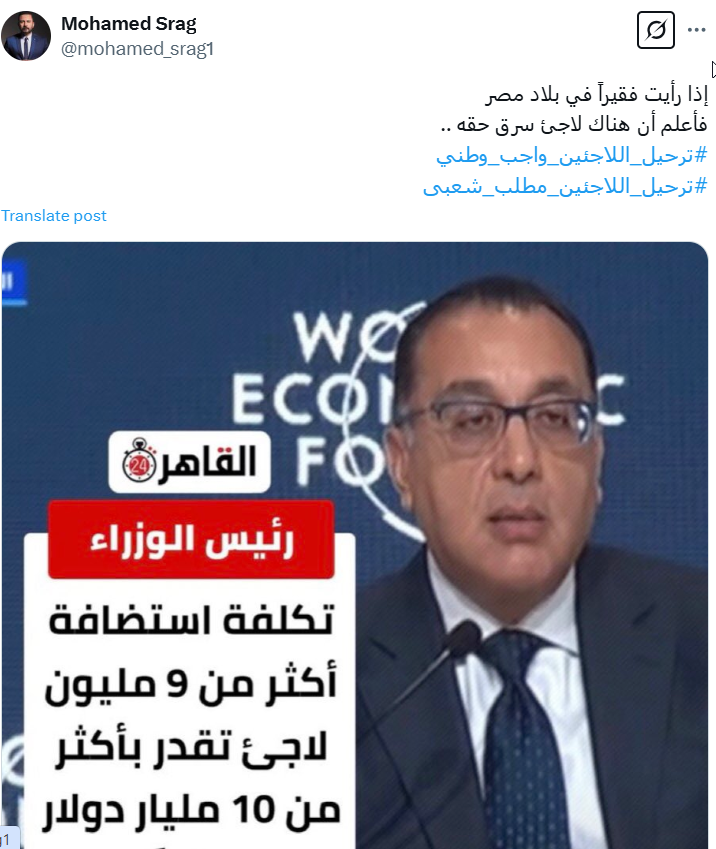
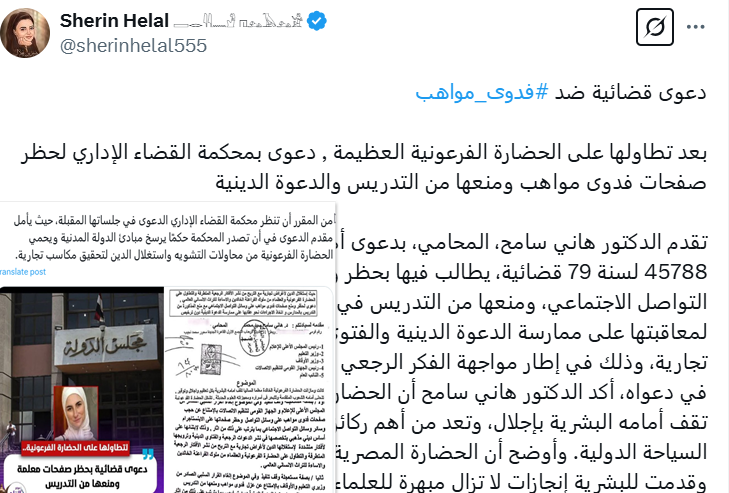
In the same context, the second most widely shared and repeated post focused on a legal complaint filed by an Egyptian lawyer named Hany Samir against Fadwa Mawaheb. The complaint called for banning her from teaching and blocking her accounts on social media platforms.
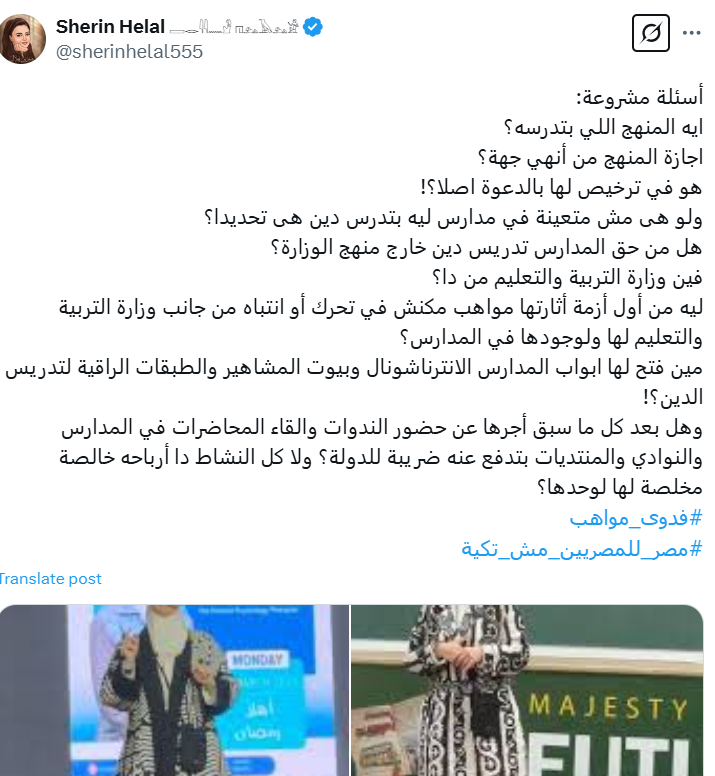
The account that posted this content was @sherinhelal555, which recorded the highest number of interactions within the campaign, totaling 212,967. The same account also shared other widely circulated posts, including one that was re-shared 244 times. This post raised doubts about Fadwa Mawaheb's qualifications to teach at international schools and questioned her commitment to paying taxes in Egypt.
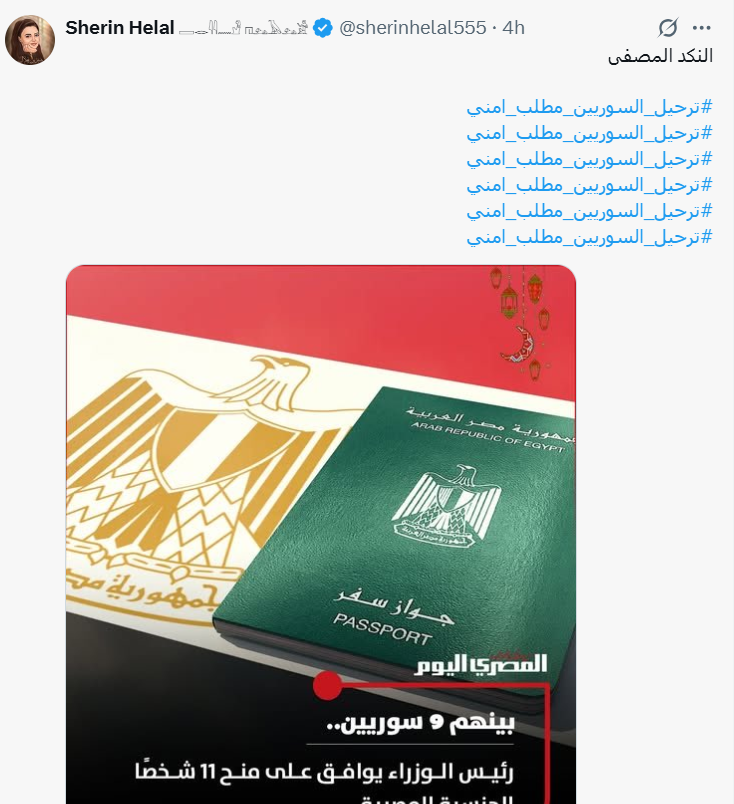
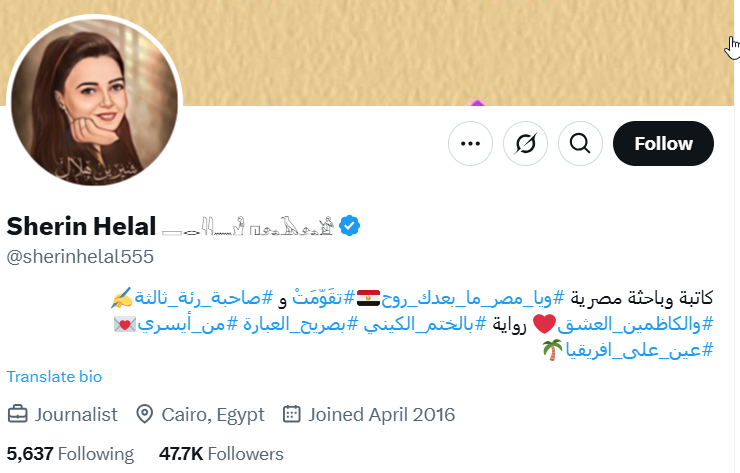
The account belongs to an Egyptian writer named Sherine Helal, who is an activist in the blogging community, focusing on the issue of refugees. She promotes inflammatory rhetoric calling for refugee expulsion from Egypt. She adopted hateful and racist language against Fadwa Mawaheb, using descriptions such as "granddaughter of the Hyksos" and calling for her deportation.
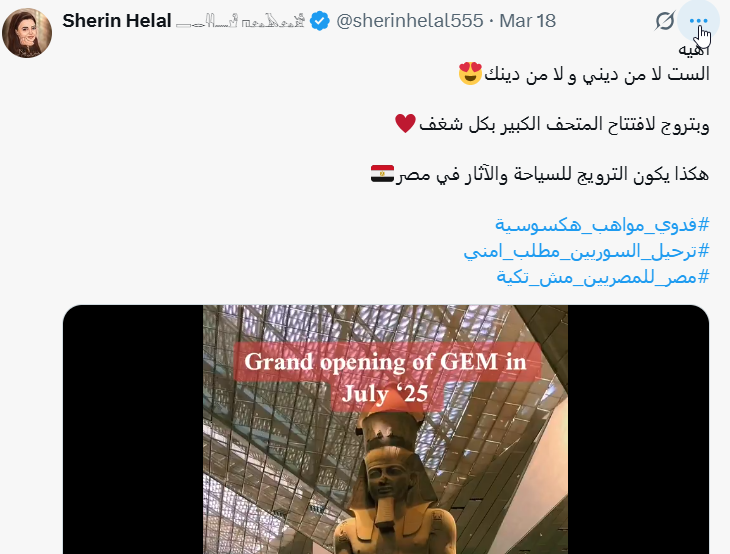
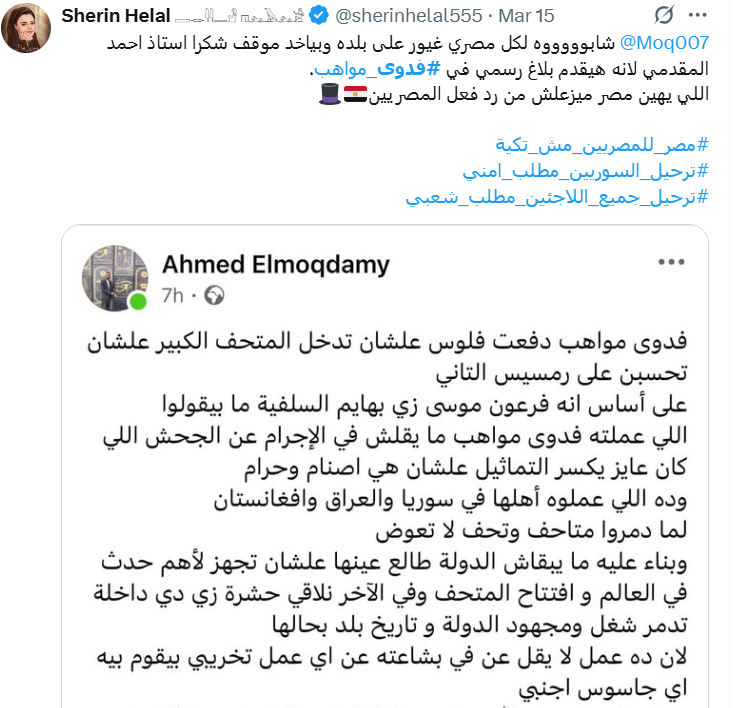
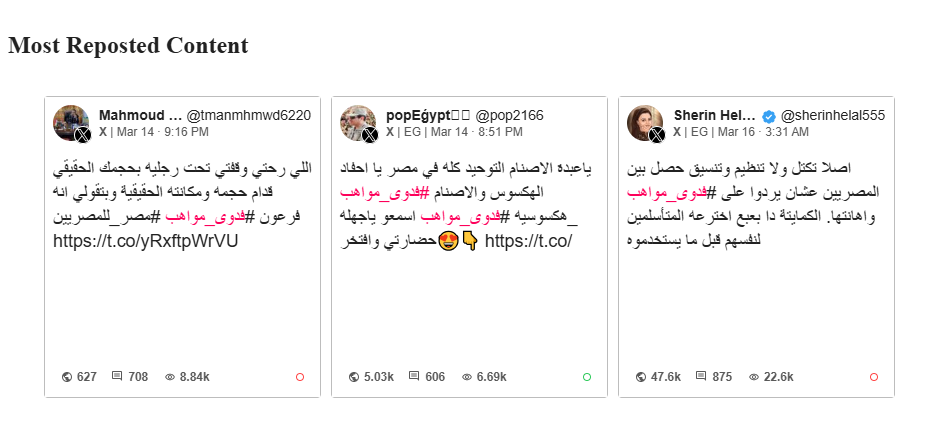
Coordinated Amplification
The posts from the accounts @sherinhelal555 and @mohamed_srag1 garnered significant interaction and notable amplification. For instance, the account @pop2166 reposted the same video clip of Dr. Mustafa Mahmoud, accompanied by a racially charged comment against Fadwa Mawaheb, and the post received 165 shares. The account is anonymous, lacking a real name or profile picture, which increases the likelihood that it is part of a network of accounts aimed at amplifying the digital campaign.
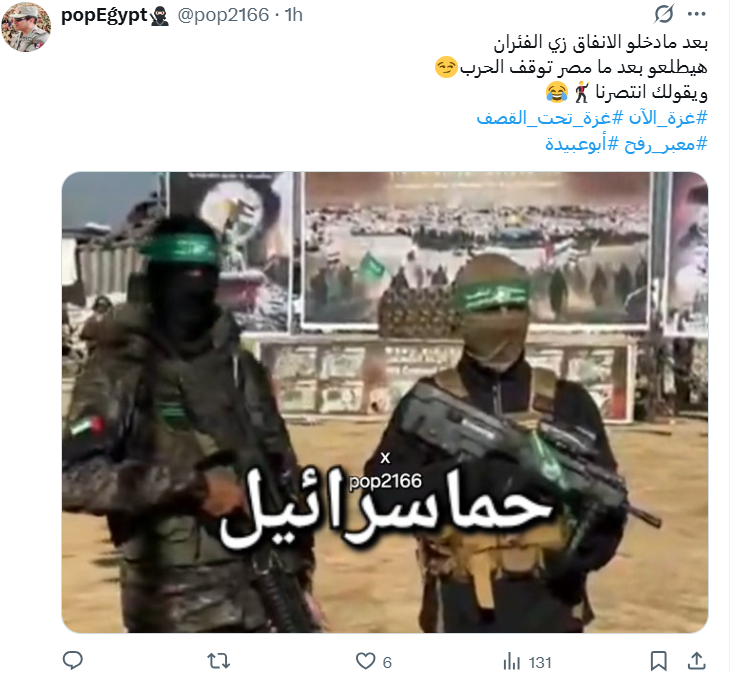
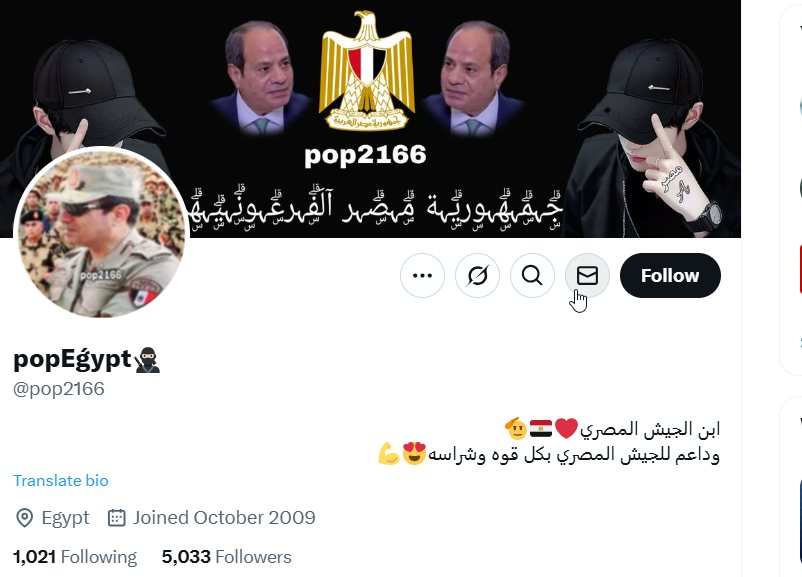
Data analysis revealed that most of the posts related to Fadwa Mawaheb were highly repetitive, with many exceeding 100 shares in several instances. This suggests a systematic reposting effort aimed at digitally amplifying the campaign.
Moreover, the majority of these posts contained incitement and racist rhetoric, using terms such as "Hyksos," "deportation of refugees," and "revocation of citizenship," along with calls for action against Mawaheb and the expulsion of refugees from Egypt.
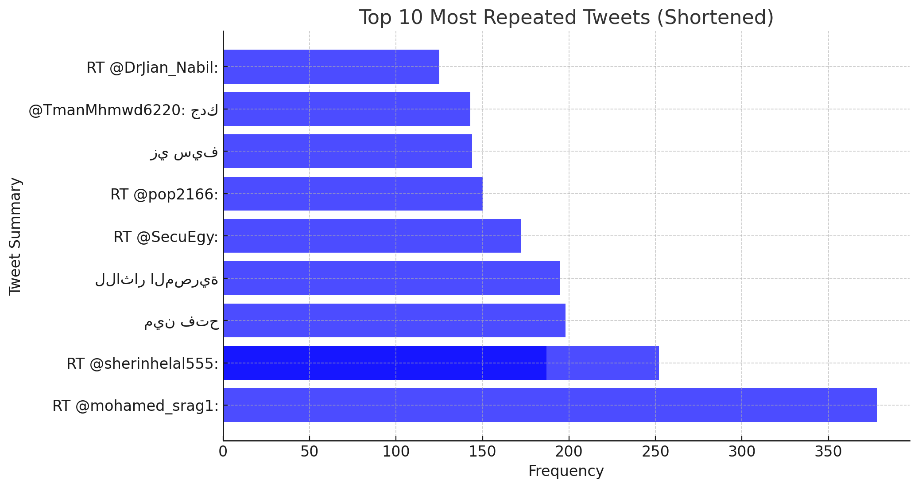
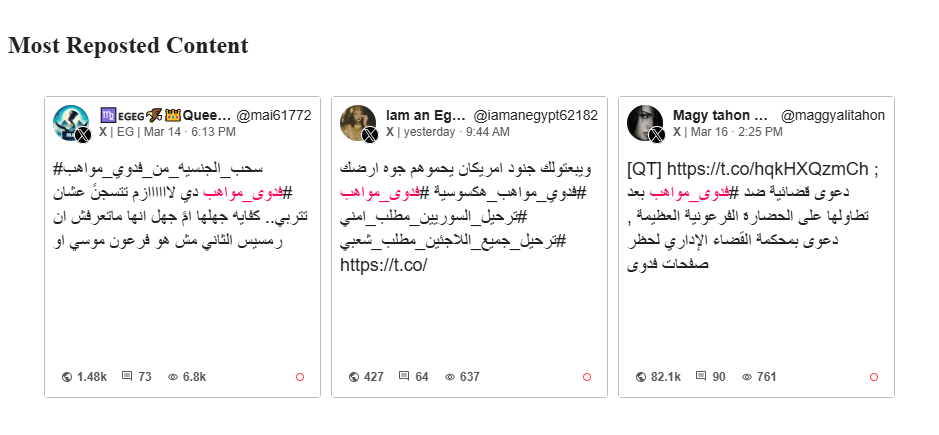
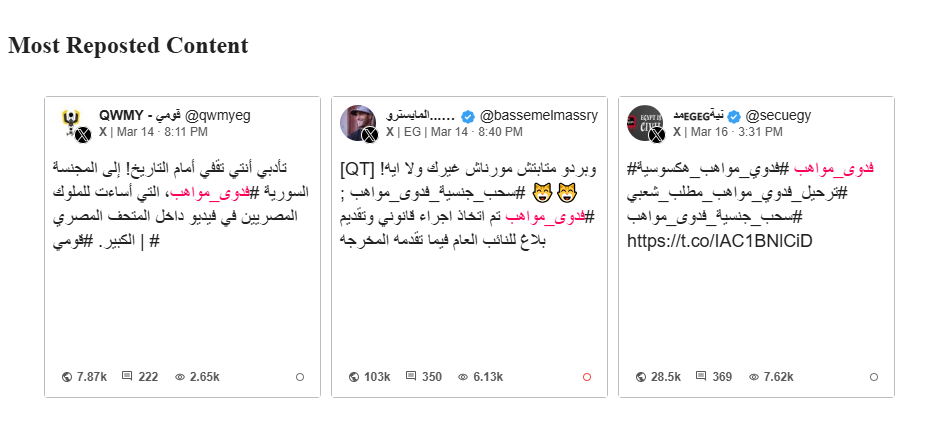
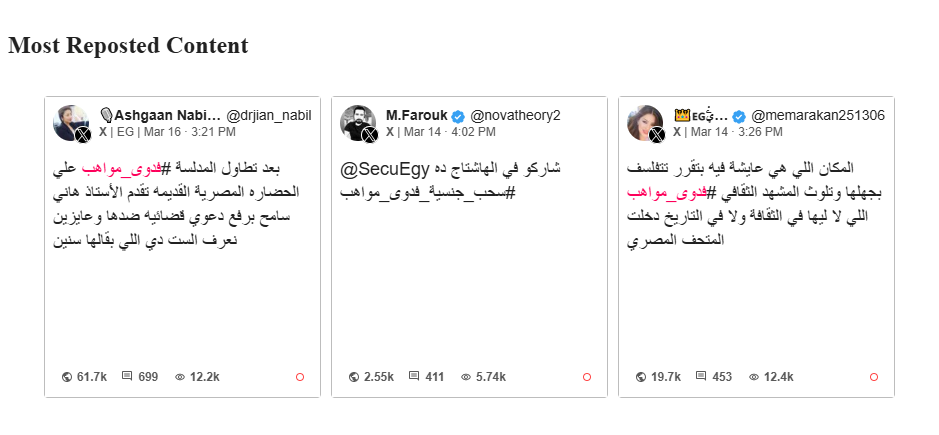
In addition to the accounts of Sherine Helal and Mohamed Sarag, the analysis we conducted on the sampled data revealed several other accounts among the most engaged with the hashtag "Fadwa Mawaheb" and the hashtags targeting refugees in Egypt.
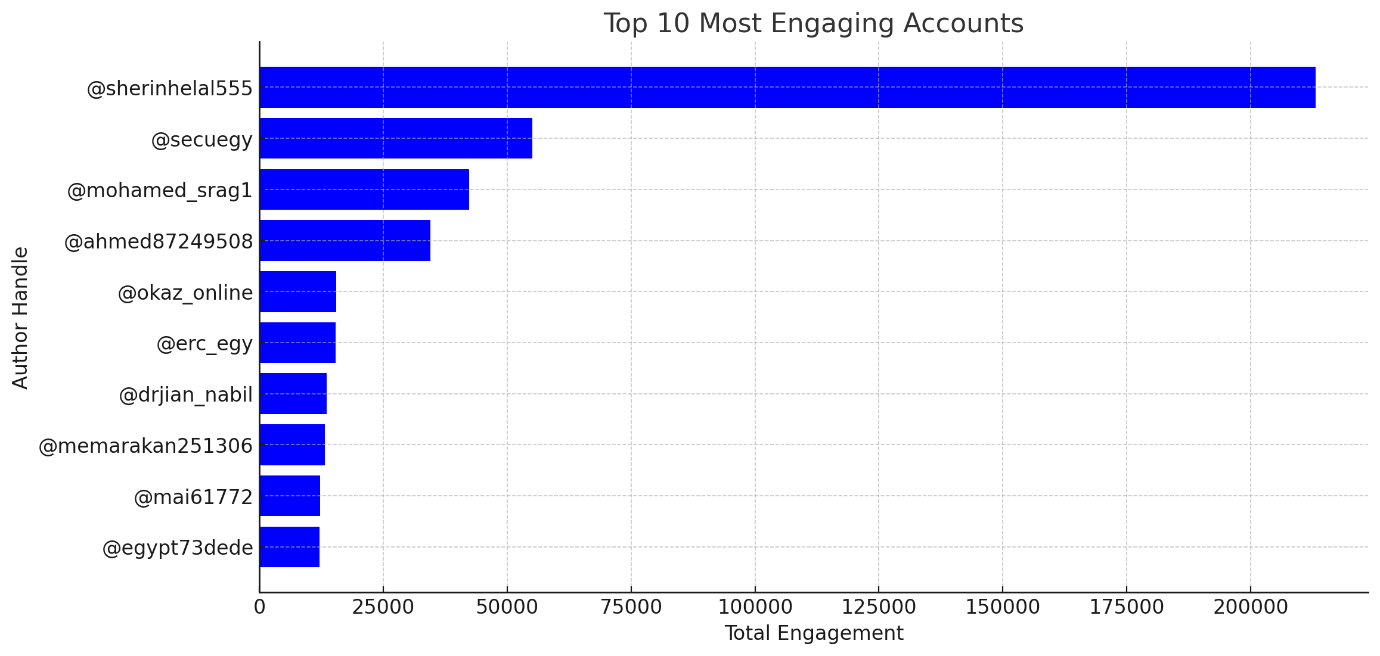
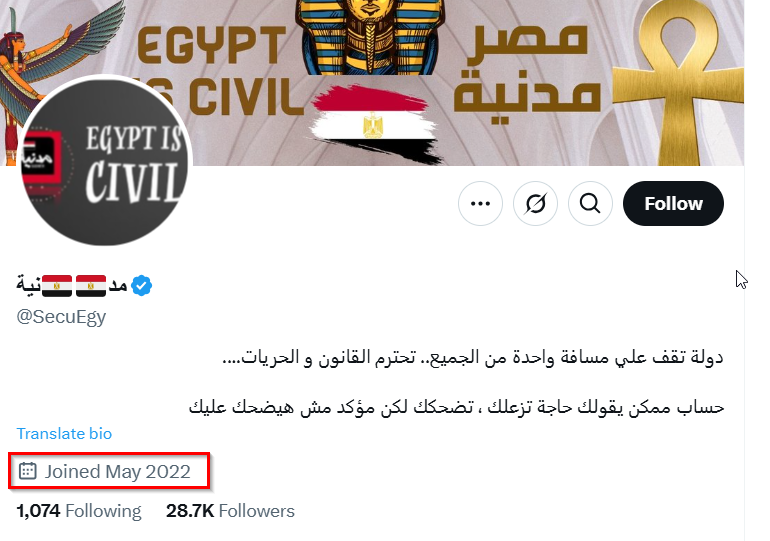
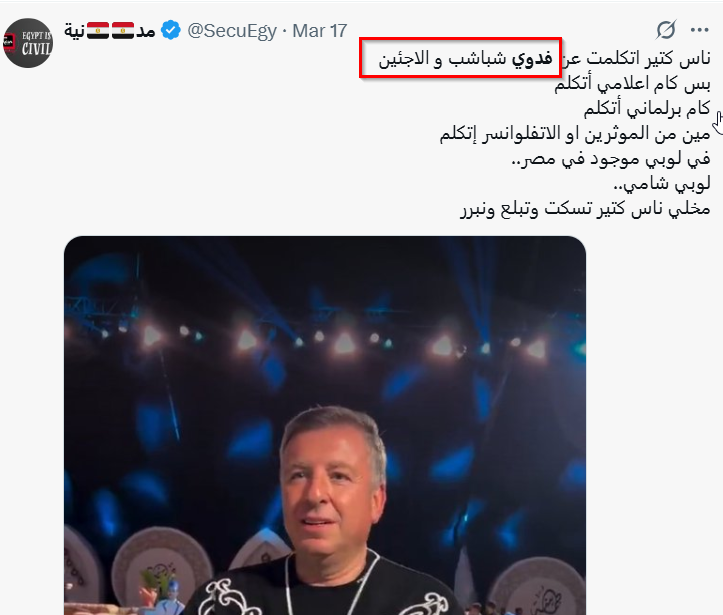
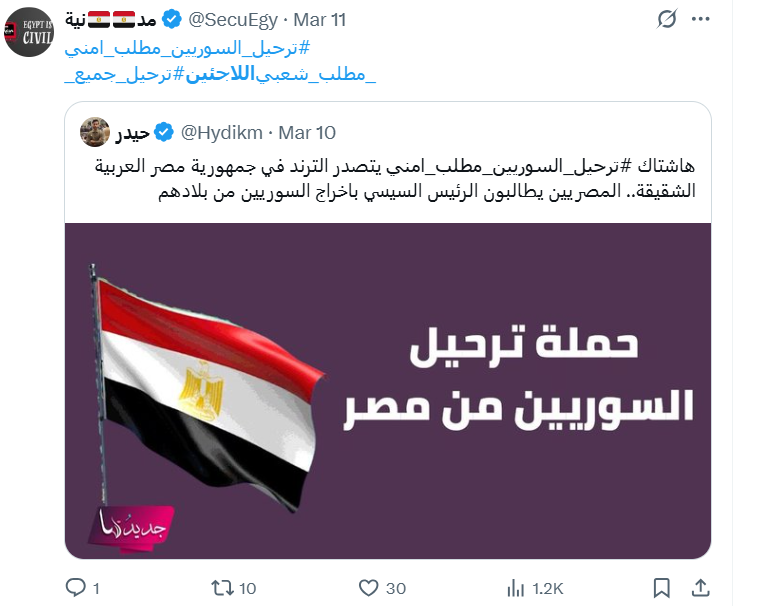
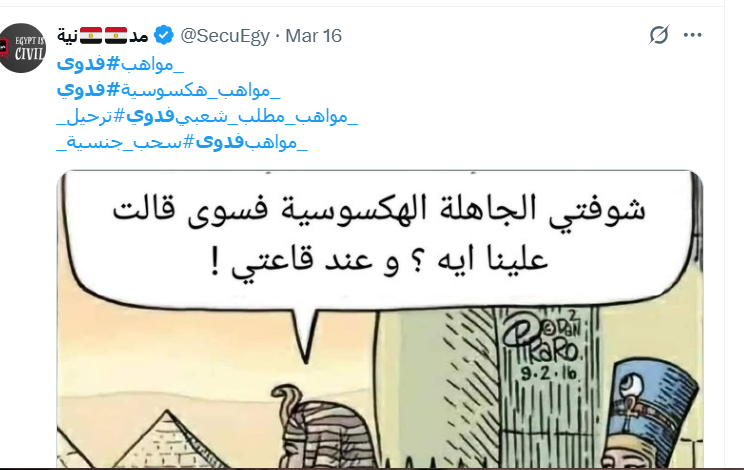
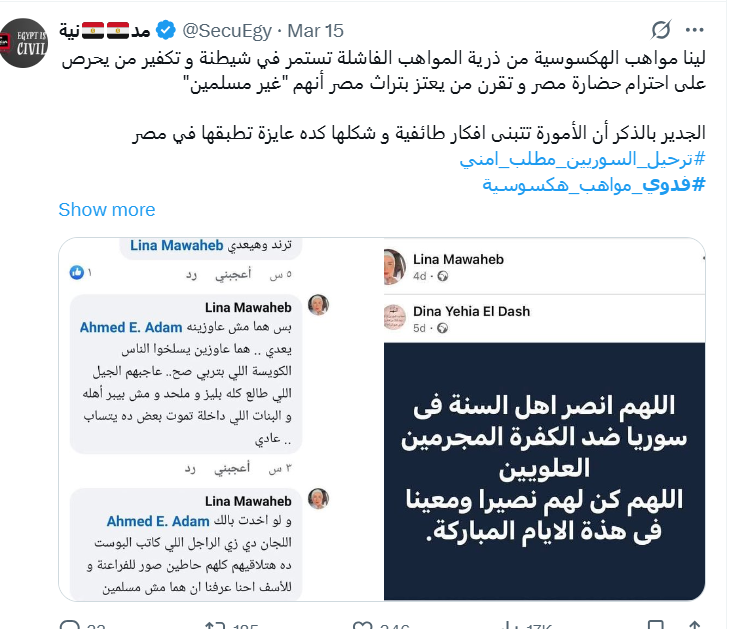
The account specifically focuses on resharing anti-refugee content from Sherine Helal's account, as well as resharing the same narrative concerning the impact of hosting refugees on Egypt's economy and national security.
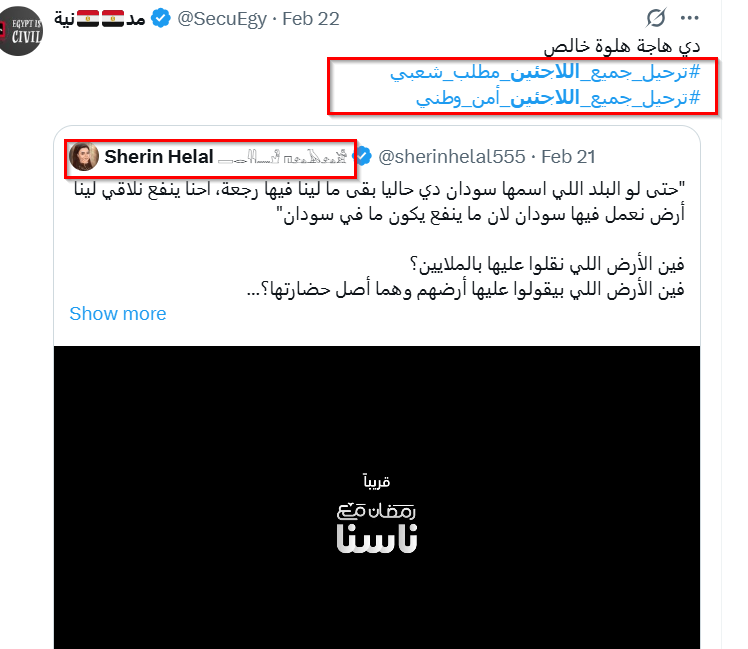
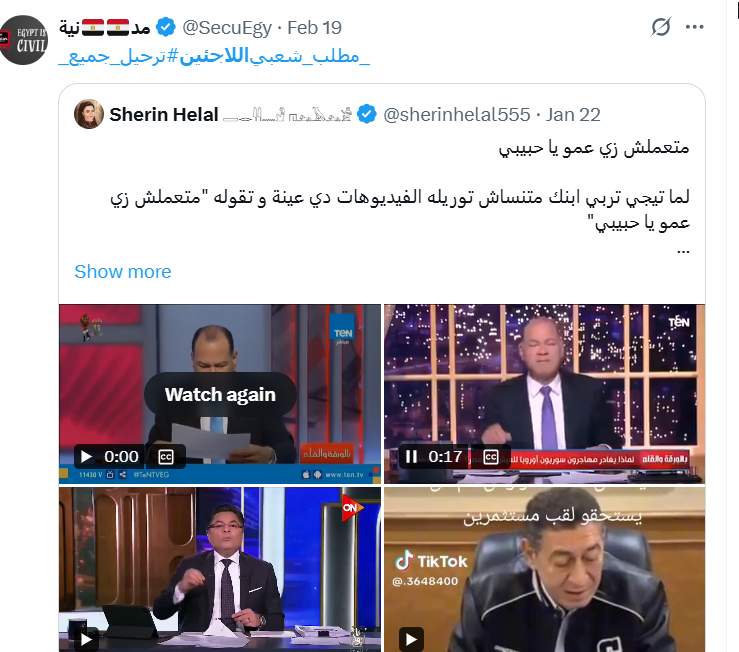
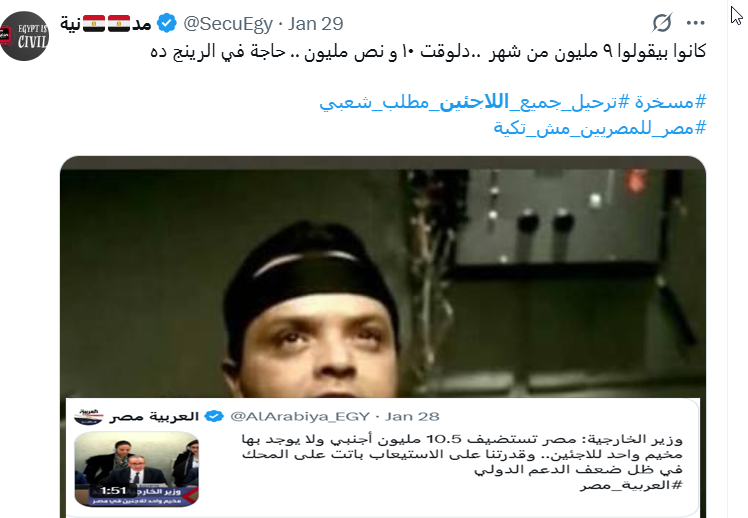
The same narrative was promoted by the account @Ahmed87249508, the posting pattern and content of which closely resembles the previous account. This account retweeted hate speech against Fadwa Mawaheb and refugees, claiming that there is a lobby working to settle refugees in Egypt.
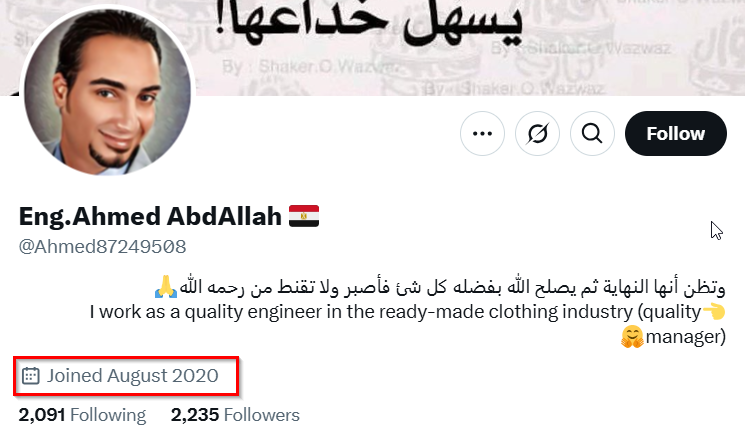
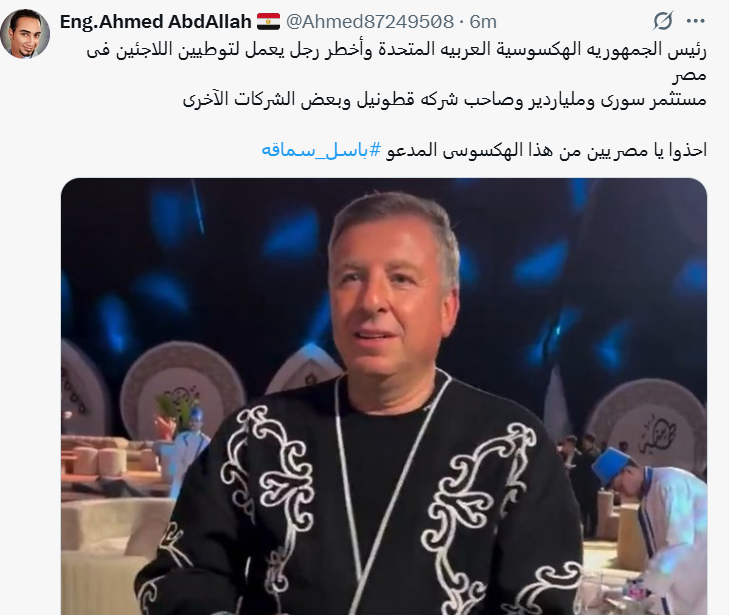
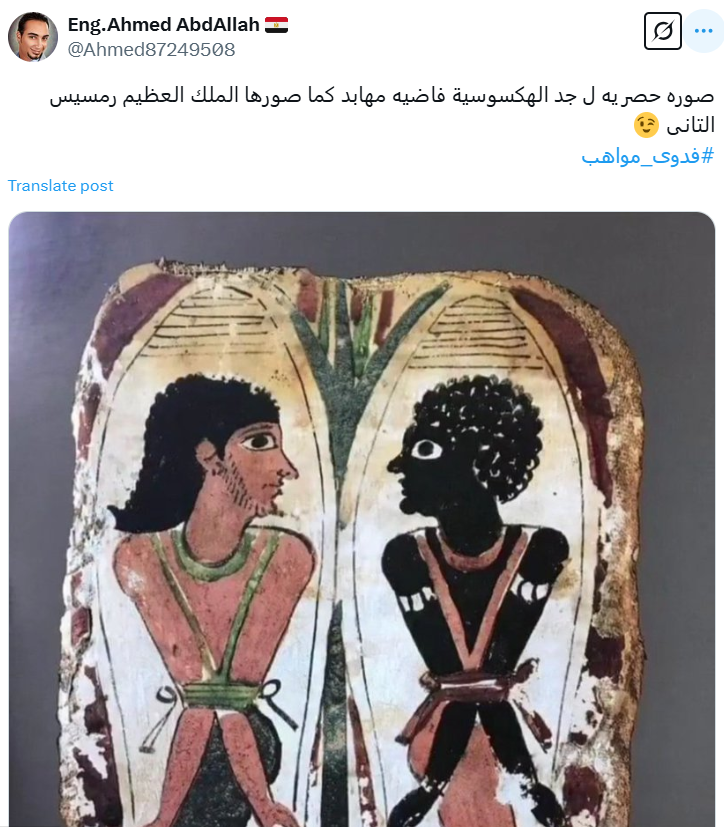
Using Gephi to map the network of accounts spreading hate speech against Mawaheb and refugees in Egypt, and applying the Yifan Hu algorithm to a data sample, revealed significant amplification. This was linked to the content of a central account within the network of active accounts involved in the campaign.
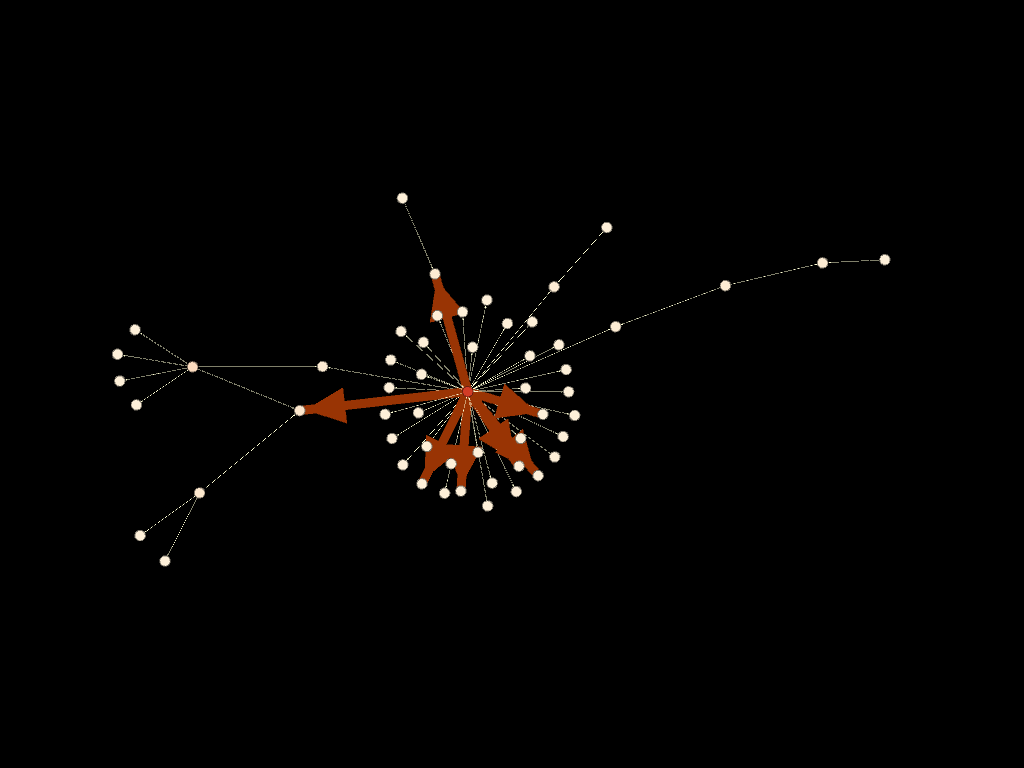
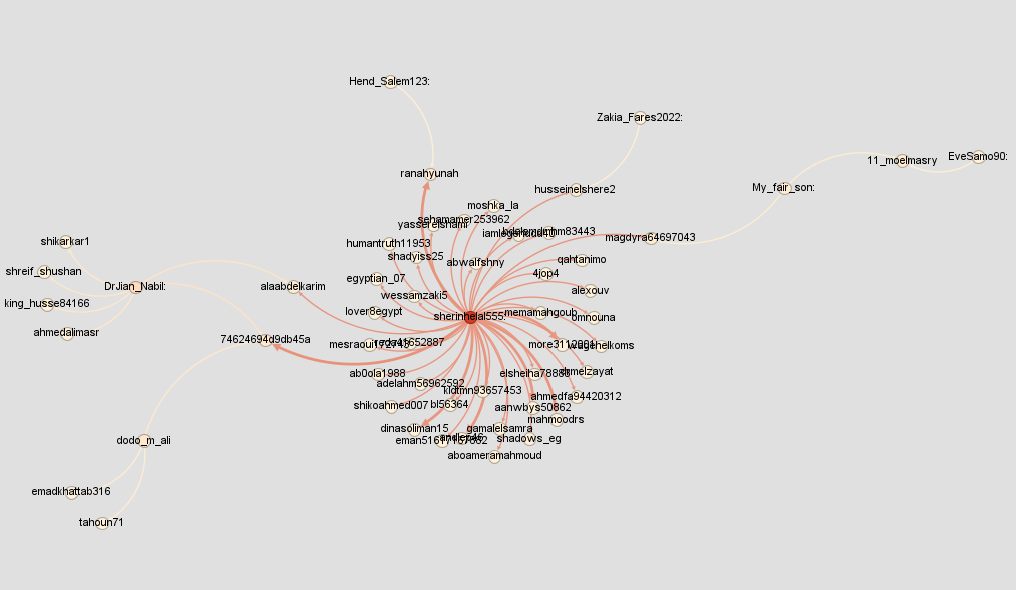
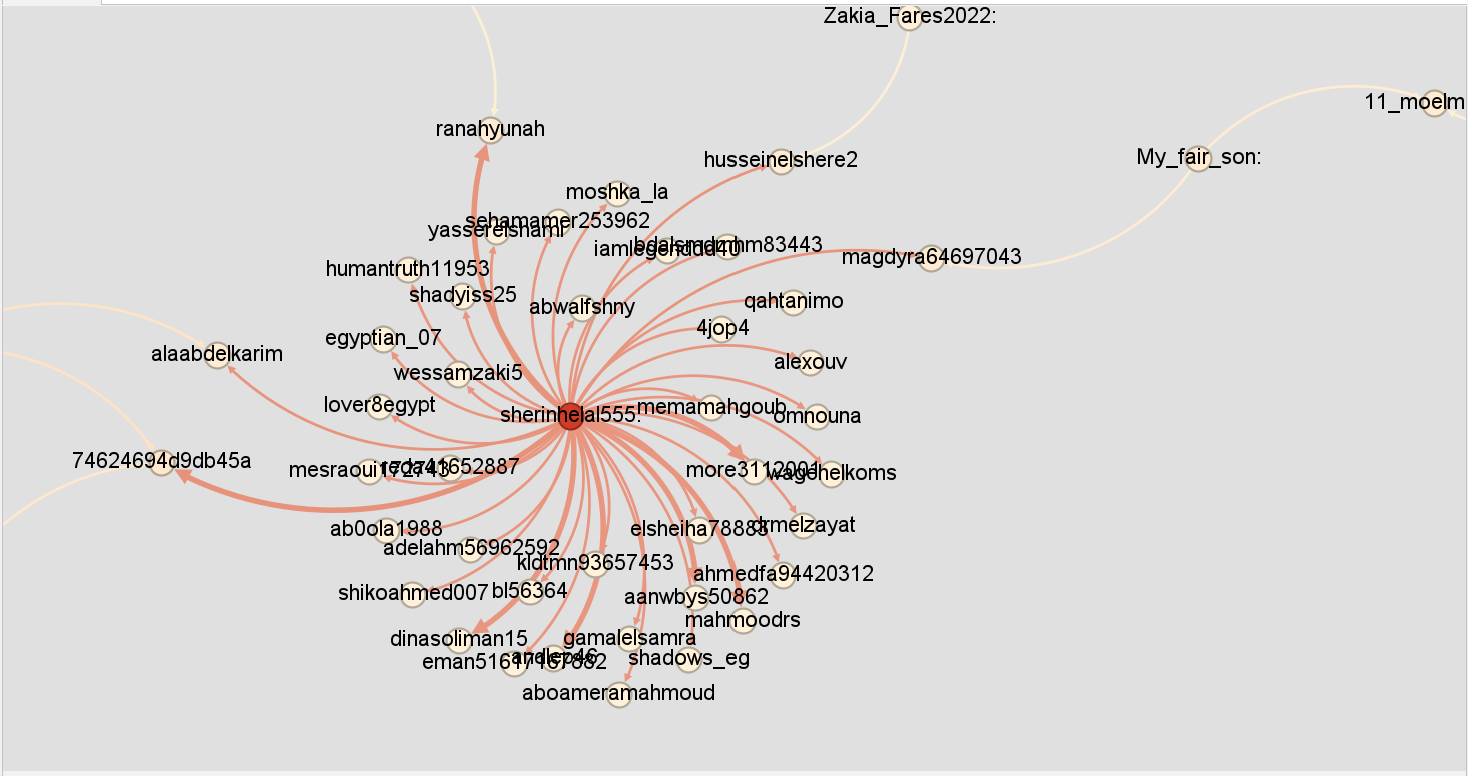
This central account is that of writer Sherine Helal (@sherinhelal555), whose posting times we analyzed using a script. The analysis showed that the average time interval between each post and the next was 17,240 seconds, or about 4.8 hours. The analysis also revealed that the shortest time gap between posts was just one second, indicating that two or more posts were shared simultaneously. This could suggest automated reposting or the use of a scheduling tool for posts.
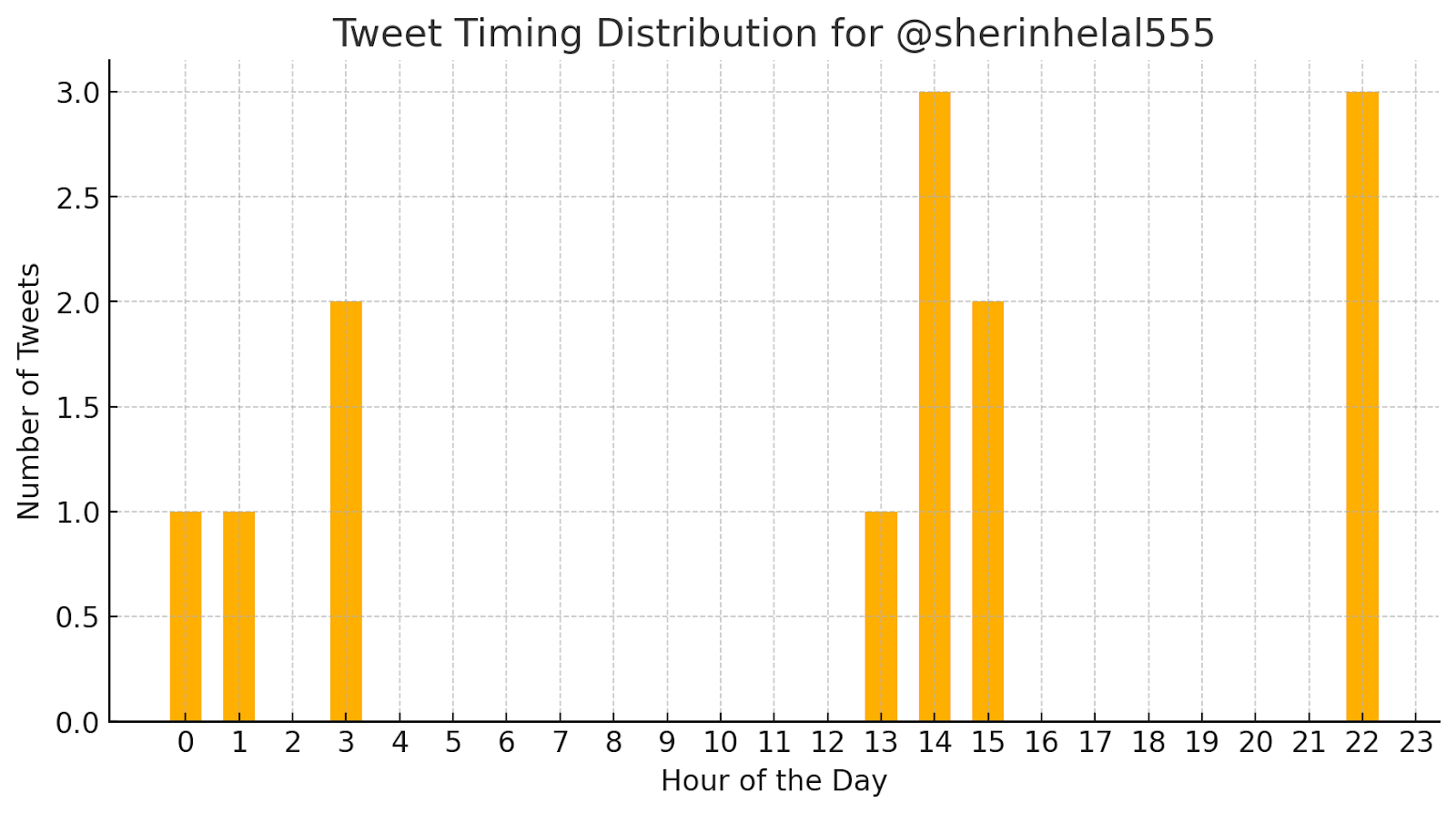
Amplifying Hate Speech
To verify the connection between the interaction campaign on the hashtag #فدوى_مواهب (Fadwa Mawaheb) and the hate speech against refugees in Egypt, we conducted a search using the following keywords: #اللاجئين (Refugees), #للمصريين (For Egyptians), #ترحيل (Deportation). The analysis revealed a significant increase in the frequency of these terms starting from March 13, 2025—the day the online campaign against Fadwa Mawaheb began. This indicates a clear correlation between the two types of discourse and suggests that their spread was coordinated in a systematic manner.
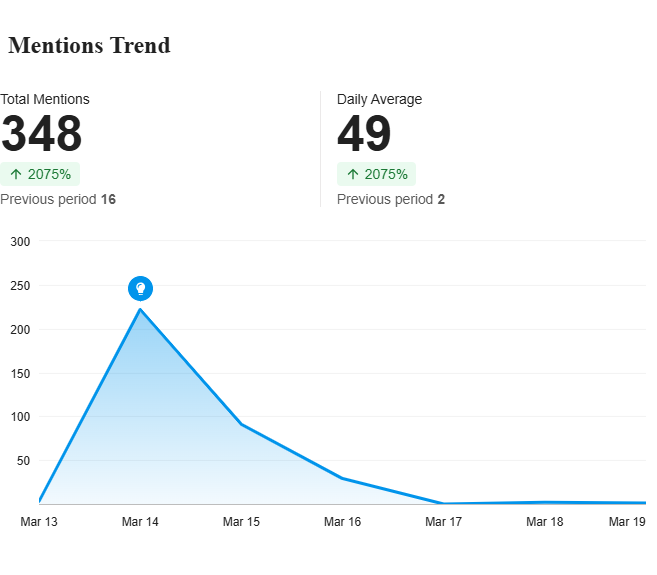
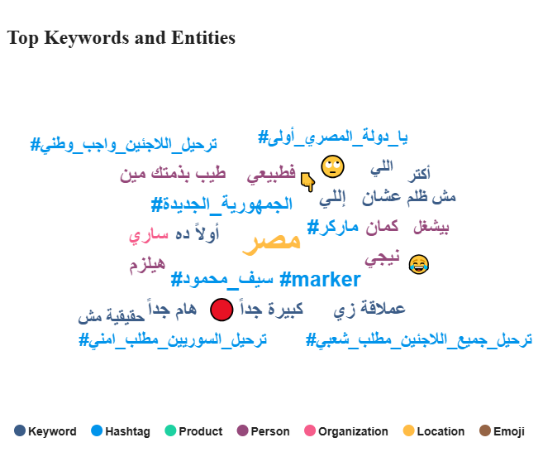
However, original content within this campaign accounted for less than 1%, while over 99% of total interactions were concentrated in reposts and engagements (comments and quotes). This indicates that the posts related to refugees were part of an organized campaign, with its content deliberately amplified.
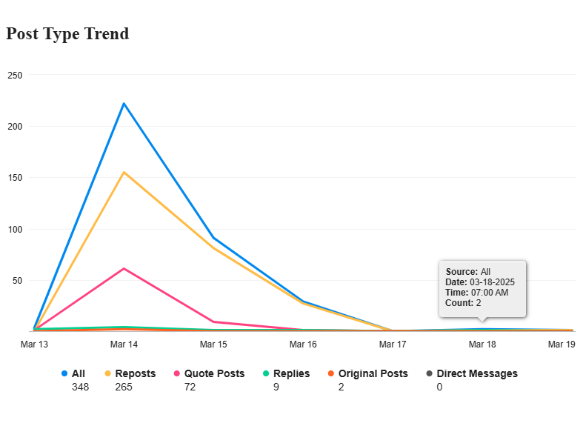
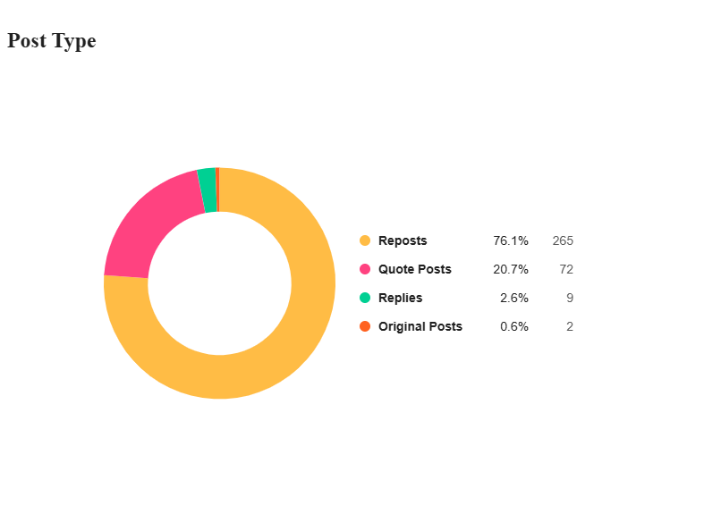
Analyses revealed that approximately 99% of the sentiment conveyed by the terms used in posts about refugees in Egypt were negative, often associated with hashtags such as #ترحيل_السوريين_مطلب_امني (Deporting Syrians is A National Security Demand) and #ترحيل_اللاجئين_واجب_وطني (Deporting Refugees is a National Duty).
